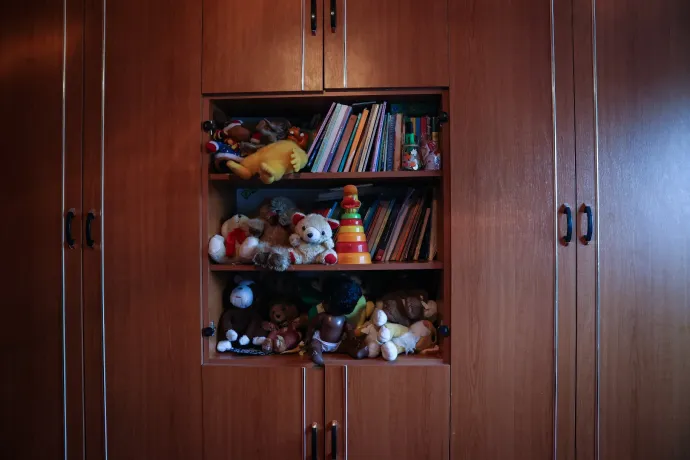
It is the foster parents' role to provide a family to the child entrusted to them until the question of said child's future is finally resolved. In some cases, however, the bond between the two becomes so strong that they end up wanting to be the adoptive parents themselves. This is just what happened to Mr. and Mrs. Balog of Balmazújváros and 4-year-old Milán, who had lived with them since he was a baby. The child welfare agency, on the other hand, decided to look for adopters elsewhere. Following an awkward meeting between the foster parents, Milán, and a couple considering adoption, the agency decided to intervene – immediately. Without taking any preparatory measures, authorities transferred Milán to his new foster family in mid-December. The Balogs then drove him a hundred kilometers to an unfamiliar place and said their goodbyes – but Milán couldn't grasp why he wasn't allowed to go home. Now the Balogs are doing everything in their power to reunite with the boy.
The double bed of the room where four-year-old Milán slept until December 14th – and where toys still cover every exposed surface – has been pushed into the middle of the room. Prior to that day in December, it had been positioned next to the wall to prevent the young boy from rolling off of it in his sleep. Milán was protected on the other side of the bed by the woman he loved as his mother and whom he had always asked to sleep next to, Mrs. Janos Balog. Since he was baby he could fall asleep just by holding onto her arm.
The bed was moved to the middle of the room after a decision by child welfare authorities ordered that Milán be removed from the family and the house that had been his home for the first four years of his life. He was transported a hundred kilometers away to a place he had never seen before, to people he had never met. Since then, Mrs. Balog and her husband, János Balog, have been doing everything they can so that the boy can come back to them – to the place they consider to be his home.
Now approaching their mid-fifties, the couple has already raised three biological children – two of which have already left the nest and started living on their own. In fact, the Balogs even have grandchildren. Their third and youngest child, Róza, has also since grown up and started working, though she still lives with them. She is referred to as "Nénje" [i.e. "Auntie"] by Milán and the other foster children.
The Balogs love children and – though the husband works as a mason – the couple were looking for an occupation that they could actually rely on in the long run. It was then that they had the idea of becoming foster parents. As the mother puts it, back in 2015 their daughter saw a promotion for foster parent training on TV and that people were welcome to apply. So the couple signed up. Mrs. Balog completed the requisite course and in October 2016, they started receiving children.
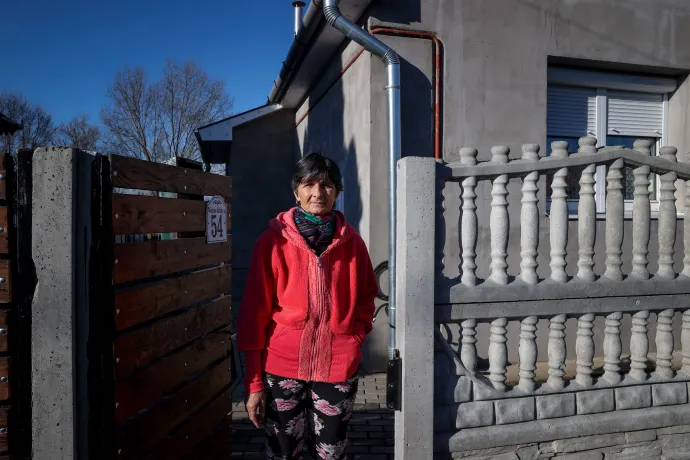
At almost 7 weeks old, Milán joined the family in February 2019. He was just one of many children for his birth mother, who did not even take him home from the hospital, though neither did she offer him up for adoption. As such, the little boy was not immediately eligible for this process. Initially, it was not easy for the Balogs, as little Milán hardly ate. Mrs. Balog said that they had tried five different types of formula before they finally found one that he liked and started eating properly.
"He grew up to be a cheerful little boy, one who loved everyone," said his foster mother. Milán loves watching cartoons, singing, and playing with cars. By winter he had even grown fond of preschool, despite not wanting to go at first. For his preschool symbol, Milán chose the hoop [when a child enters preschool in Hungary it is customary for them to select a symbol to consider their own throughout their time at the institution]. He is a quick learner and became potty trained relatively early on. The photos of him that Mrs. Balog presented show a small child with huge eyes looking at the camera – some with presents from Santa, some of him framed by the Christmas decorations at his preschool. His foster parents were not the only ones who saw him as a healthy, thriving, fine young boy. When the Balogs asked Milán's kindergarten to write a statement about the boy to help their legal struggle, there they also received a very positive assessment.
Outside in the Balogs' yard, where Maja the tabby (named by Milán) roams, there are two children's swings. Young Milán was raised as the brother of another foster boy almost the same age as him, who is still with the family. When we visited the family one day in January (while the preschool was on break) he went back and forth between riding his bike and playing with toys.
Eventually, since his birth mother failed to come forth, Milán was declared adoptable in November 2021, and the Balogs – who, as is natural as foster parents, had already experienced separation from children placed in their care – decided that this time they would like to adopt the boy themselves.
As mentioned above: in the normal course of things, foster parents and their children are eventually separated. Adoption and foster care are fundamentally different. The latter is a paid profession, and the foster parent's role is to provide a family environment for the children placed in their custody until the question of their future is finally resolved: either until they can be reunited with their birth parents, provided conditions there have improved, or they are adopted.
However, sometimes the foster parents become the adoptive parents – a process that we will elaborate on later – and this is precisely what the Balogs would have wanted with Milán.
They applied to adopt him, but their request was not granted.
Of course, we wanted to know how the child welfare agency assessed the situation and what considerations went into this and subsequent decisions regarding Milán. We contacted the relevant government office of Szabolcs-Szatmár-Bereg County with our questions and received the following reply: "All of the information indicated in your request is considered personal data under the legal provisions referred to, and according to the provisions of the Info Act and the Act on the Protection of Children and Guardianship Administration, you are not entitled to access the data."
Had it been a few years earlier, there would have been a real obstacle to the Balogs' adoption: the couple would have been considered too old, as the maximum age difference between the two parties involved in the adoption is regulated by law. Previously, it allowed a maximum of 45 years between the younger individual of the adoptive couple and the child, and in the Balogs' case, the wife was born in '68 and the husband in '69, while Milán was born in 2018. However, by the time the Balogs applied, the law had changed in their favor. The requirements were eased to the extent that age was no longer an issue for them: since the Autumn of 2020, the new regulation permits an age difference of up to 50 years for children over 3 years old. Nevertheless, the agency was of the opinion that Milán should be given up for adoption elsewhere.
The standard procedure was then put into motion: Milán was offered to couples waiting to adopt – and two appeared on the scene. One of them backed out as soon as they learned that Milán's foster parents wanted to adopt him. A meet-and-greet was organized with the other couple on November 3rd, 2022. As requested, the Balogs drove Milán to Nyíregyháza, where they sat down in a meeting room at the child welfare service office. While the boy played with the toys brought from the psychologist's office, the adults introduced themselves. Then the candidate couple went to play with Milán.
Accounts of exactly how events subsequently unfolded differ in some respects depending on who you ask. What is certain is that the meeting did not end happily. Tensions flared up over a toy car that had been given to Milán by the adoptive couple.
According to Mrs. Balog, at the end of the meeting, the child came up to her holding a toy that she didn't recognize. "Milánka came up to me with this little car. I told him he wasn't allowed to take it because it wasn't ours and that he doesn't need it since he already has plenty of them at home," she recalled. She said she hadn't seen where the toy car had been earlier, she just knew it wasn't theirs. Then, when the counselor intervened and asked them to let Milán take it, they expressed their thanks and put it with their things. After that they said goodbye and went home. In any case, the Balogs hadn't talked much to the couple considering adoption. The couple did not ask them about Milán. Mrs. Balog can't even remember their names.
She later learned from the counselor that the couple had backed out of the adoption.
On December 9th 2022, the child welfare agency issued a decision: it was decided that Milán was to be moved to another place of care, immediately. The ruling stated that the foster parents were obstructing the adoption process of the minor, which, from the point of view of a child protection guardian, seriously jeopardizes the minor's overriding interest in being brought up in a family environment. According to the agency's interpretation, during the toy car incident, the foster parent created a hostile atmosphere that caused the couple to withdraw. According to the Balogs, this erroneous conclusion was the result of a misunderstanding.
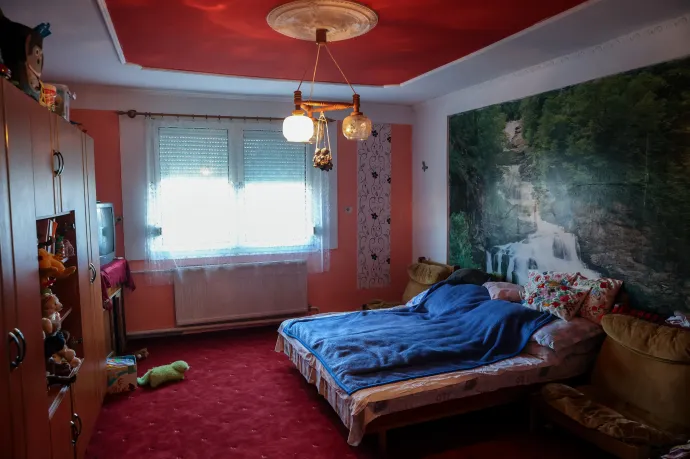
Fearing that they might lose Milán overnight, the Balogs had already drawn up a document in November in which they renounced their intention to adopt, in order to protect the boy from the trauma of an immediate separation and to give them time to prepare him for adoption. They did this in order to protect the boy from the trauma of an immediate separation and to have time to prepare him for adoption.
But that no longer mattered. On December 12, the Balogs were sent a decision by email: On December 14, Milán was to be transferred to another foster family in a town about 100 kilometers away. The counselor phoned Mrs. Balog to ask her to prepare an inventory and pack up Milán's favorite clothes and toys, as he was to be moved on Wednesday. At the time, the young boy happened to be struggling with a nasty virus causing vomiting and diarrhea, so the couple was also worried about him getting dehydrated.
The foster parents were devastated by the news. According to Mrs. Balog, her husband left work and rushed home that Monday upon hearing about the counselor's call. However, she said that the idea of refusing to take Milán to the designated location never even occurred to them, for they knew that it would be pointless: either way, the child would still be taken away from them – with or without the involvement of the police.
Milán did not ask why they were packing his things together while he was sick in bed. Because of the little time they had left, the couple didn't even try to prepare him in advance for what was to come. "We're going to a place, and then you'll come home" – is all they said to him as they got into the car on Wednesday and set off on the hundred-kilometer drive, followed by another car with a child welfare worker. They sincerely hoped that such an injustice could not happen and that the authorities would rectify the error. As Milán was already somewhat familiar with the local roads, he asked his foster father to turn back because they weren't going the right way. The foster parents wanted to keep Milán from crying, but of course, he ended up shedding many tears.
The transfer was a horrific experience. When they pulled up to the house, the new foster mother beckoned them in, lest the child catch a cold. Once inside, they asked Mrs. Balog a few things, and she anxiously explained how to administer the medicine she had brought with her.
"Then the counselor came and asked me about the daily routine, and I told him everything. At that point, we were told it was time to say goodbye. 'You can say goodbye,'" she recalled. Another young boy at the house had already started showing Milán where he would be sleeping and where his bed would be. But he shot back that he wasn't sleeping there: he was going home. "When I said to him, 'Milán, be a good boy, we're leaving,' he started crying and ran to his father. Milán wrapped his arms around his father's neck, who got down on the ground. Then the two of them pried the child from his shoulders. Both of them. That's how we left them," she continued. She said that this all took place in a matter of minutes.
They haven't seen Milán since that day, December 14th. They have called twice to ask about him, but they've resisted the urge to do so again because they were advised not to bother the other family. As far as they were told, Milán had cried a lot and was almost inconsolable, but most recently they heard that he was starting to adjust. Mrs. Balog finds it hard to believe.
The loss of Milán has not only taken its toll on the couple, but also on the other little boy, almost the same age as Milán, who had been raised as his brother. As his birth mother has not visited him for some time, he has also been put up for adoption. Unlike in Milán's case however, there haven't been any interested couples as of yet. The Balogs have applied to adopt him as well. They would be happy to give up foster care and the compensation that comes with it if both children could stay with them for good.
"Even yesterday he woke up and came out of his room wondering where little Milán was," recounted Mrs. Balog. He asked the couple to drive out immediately to where the boy was and bring him home. When they told him that Milán would be coming home, he began to press them: that's not good enough – they have to go now. Neither does he play much with the old toys he used to share with Milán. According to Mrs. Balog, the toy cars were left the same way that Milán had left them.
"The house is pretty empty. Even though there are still a lot of us living here, it's just not the same. You can feel that something's missing," says Róza, the Balogs' youngest biological daughter. She joined her parents and Milán on the difficult car trip on December 14th, having requested time off from her job at an accounting firm in advance. Her boss, Beáta Kincs, inquired as to the reason, and when she heard the story, she decided to try to help the family. Within a day, a small team of four – including a lawyer from Budapest – was formed. Since then, they have been filing petitions, writing letters, seeking expert advice, and trying to explore all legal and non-legal options that could give them a chance at getting Milán back. But despite being highly qualified and there being four of them, even they find it challenging to navigate the sea of bureaucracy and regulations. For foster parents with a more modest educational background, this would be an impossible task – making it infeasible for them to protect their rights and represent their interests.
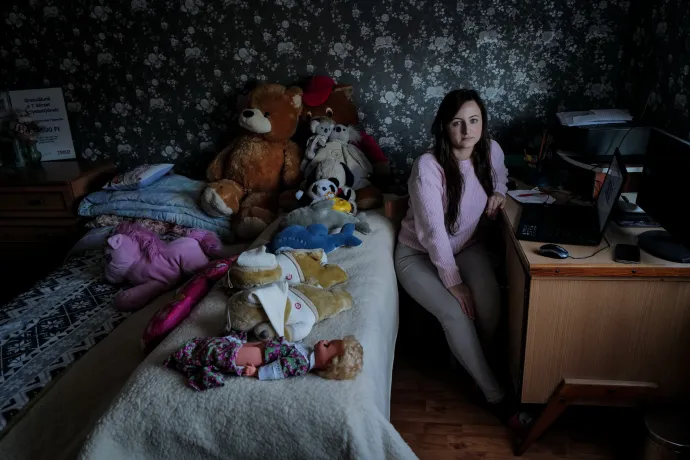
One of their first steps was to start a petition before they actually had to surrender Milán. The petition "Let's stop the immediate removal of a four-year-old foster boy from his family" gathered 1,200 signatures in its first two weeks online, which was accompanied by another 300 on paper. Relatives and friends made rounds around the neighborhoods for their sake. From the remarks, it was clear that most of the signatories were from Balmazújváros: people who knew the family and saw that the children were in good hands with them.
As Kincs tells it: just before Christmas the signatures were taken to the district office in Nyírbátor, along with 10 kilograms of szaloncukor candies – a symbolic amount as the number of individual pieces matched that of the signatures. It was intended as a gesture, but according to Kincs, it was met with a negative reaction at the administration. They were told that the case was not about what anyone thought of the Balogs. But there was never any issue with the fact that the petition could not be used in an official setting such as the court. Rather, the goal was to demonstrate the family's positive reputation within the community, as would be shown by a neighborhood survey. Incidentally, in its decision statement, the agency itself wrote that "the foster parents raise the minor in a loving environment, ensuring all aspects of care," – something that the Balogs refer to in their lawsuit.
In the run-up to Milán's December 14th handover, they had also prepared a legal filing. The family, or more precisely Mrs. Balog, sued the Nyírbátor District Office of Szabolcs-Szatmár-Bereg County, seeking a ruling from the court on whether the decision to change the custody of the child was lawful. This was supplemented by an application for immediate judicial protection. The hope was that this would result in a deferment and prevent, or at least delay, the separation from Milán. But the application was unsuccessful, though it wasn't until December 29th that the Debrecen Court issued a ruling rejecting it.
This rejection has no direct bearing on the merits of the lawsuit however. In the meantime, the Balogs have attempted to file another application for immediate judicial protection in January. It would return the boy to them until a decision is made on the matter. This time the application was also supported by the opinion of psychologist, family therapist, and renowned sociologist in child welfare Mária Herczog.
The Balogs contend that the decision to take Milán away from them is contrary to the child's best interests. And the trauma and frustration caused by the separation must be dealt with even if the outcome of the lawsuit is not in their favor. They would undertake to do this with professional support: to restore the trust that had been lost, thus providing the transition for the little boy to settle in with his new family.
"I've always looked out for the child's best interests, not my own," said Mrs. Balog. In any case, she and her husband feel that it would be best for Milán if he could go home with them definitively, given that they raised him his first four years, taught him all sorts of things, and they are the ones he knows best. No explicit justification was ever given to Mr. and Mrs. Balog by the agency as to why it did not support their adoption of Milán.
Milán calls Mrs. and Mr. Balog mom and dad. Until he was taken away, he grew up believing that they were his biological parents. According to professional opinion, from a psychological point of view, this is unfortunate. Foster parents are held to a standard of honest and open communication: to convey to the child, in accordance with their age, the truth about their family relations. This is simply because it might come out at any time anyway: for example, due to the different surnames of the child and the foster parents. There is a reason, for example, why effort is made to ensure that children have their own biographical album, where they can see photos of their birth parents and foster parents.
The foster parents are regularly visited by child welfare counselors, and so were the Balogs every two to three weeks. Child welfare workers also dropped by to monitor how the children were developing and how they were treated in the family. As mentioned before, the authorities rejected our questions about Milán, citing privacy rights. Without their input, it is impossible to ascertain whether they detected, and if so, what they thought about Milán not knowing that this was probably not his permanent home and that his parents were foster parents.
"I know that the Balogs were not entirely professional in the way they interacted with the children. They 'merely' loved them, and did so without maintaining some distance in preparation for an eventual parting. This is also a very difficult task, especially with a child raised from birth. At the same time, it makes me wonder whether the system is any good considering that it doesn't educate, develop and support foster parents in this difficult task, but rather labels them as qualified and 'uses' them as long as it needs them, punishing them inhumanely if they make mistakes. Moreover, the child is paying the price along with them," says Kincs, one of the individuals helping the parents' case. Incidentally, observations also led to the question of whether the Balogs' Roma background might have something to do with the fact that they are approved as foster parents but not regarded as adopters.
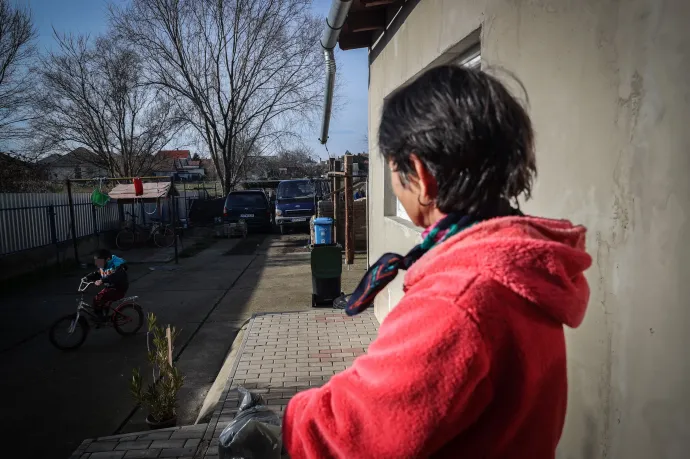
The fact that Milán and the Balogs have developed a very close bond and that the boy sobbed profusely at their parting does not in itself imply anything bad if he ends up being adopted by someone else. Quite the opposite in fact. According to Anna Bátki, a clinical psychologist and one of the founders of the ELTE's Infertility, Reproduction and Adoption Counseling Program, "a strong, positive and safe relationship with a foster parent does not undermine the adoption of children, but helps." This is because if a child has already acquired the capacity for attachment, it is easier to apply it to the new parent. A child who has already formed a close relationship with a foster parent can more easily make the transfer to another. A difficult separation and crying is "actually a good sign because it means that the child had a secure bond", explained the psychologist. What is really suspicious from a professional point of view is when an adoptive couple goes to meet a child for the first time and the child is immediately very friendly.
As for how often foster parents end up adopting in Hungary, we weren't able to find any current statistics. A week ago, we contacted the Ministry of Culture and Innovation, which includes the state secretary in charge of adoption for families, for data. We didn't receive a reply by the time of publication of this article. However, we came across a few figures from 2015 on örökbe.hu, a site that helps navigate the adoption process. According to the seven-year-old post, at the time there were about 50 such adoptions a year. These cases accounted for 10-15% of the closed adoptions, but the variation was great: in some counties, 50% of adoptions from state care were made by the foster parents, while elsewhere it was only 3%.
According to Léna Szilvási, the technical manager of SOS Children's Villages, attitudes may indeed differ from one area to another, as the issue isn't simple, nor black and white. She said that practices in different countries are also very different: In the US, for example, half of the children who are raised in foster care are adopted by their foster families, a practice that is financially supported, whereas in the UK the proportion is only between 10 and 20 percent.
Children's rights activist and director of the Hintalovon Foundation Szilvia Gyurkó wrote to Telex, "In fact, in Hungary there used to be a practice of not supporting foster care adoption – which was so in order to avoid it from becoming a kind of loophole for those who would otherwise not be able to adopt, and so as not to encourage foster parents to do so because they were very much needed in specialized care. But this rationale is in no way defensible or tenable. Decisions must be made according to the needs and interests of the child." Since current legislation dictates that the main interests of the child must be the primary consideration in all decisions concerning them, Gyurkó believes that the question is not whether a foster parent should be allowed to adopt a child, but what the child's interests and needs are, and how best to respond to them.
As Szilvási explains: there are two competing concepts here. On the one hand, it is best for the children if their home changes as little as possible throughout their lives – from this point of view, it would be optimal for them to be adopted by the foster family. The other idea is that a foster family by definition provides temporary care – the child doesn't go there for the purpose of being adopted. Whether the scales tip one way or the other is influenced by several factors. One of the most important is whether the process takes place quickly enough. The longer the wait for the child's future to be settled, the more attached they will become to the foster parents and the more traumatic the separation will be.
According to the SOS Children's Villages expert, foster care adoption may be in the best interest of the child if they have been already been there for a long time and have become very attached to them, if the foster parents don't have many other foster children (because there is always the question of what will happen to the other children), or if the child is older, disabled, or otherwise less likely to find an adoptive parent.
A prior inquiry by the Ombudsman has also found that "there may be a situation where it is in the best interest of the child to be adopted by a foster parent, but this must be considered on a case-by-case basis."
There is an example (in a case very similar to Milán's in many respects) of the public prosecutor's office intervening by exercising its role to protect the public interest and representing the interests of the child: it resulted in a favorable outcome for the foster parent. The Pest County Prosecutor's Office reported such a case last October. The bottom line in that case was that a recent psychologist's report, prepared by the child protection service, concluded that the child couldn't form an attachment to other parents but rather only bonded to the parent who had been fostering the child since the age of two weeks. Further, the child didn't have any so-called "capacity for attachment", so it was in their best interest to stay with the foster parents. In this case, they were finally allowed to adopt the child.
Maintaining the ability to form an attachment, if it is still there, is vital. Extreme care must be taken with relocation.
The transfer of a child from one foster family to another could be justified if the authorities judge the current foster family to be resistant to and uncooperative with adoption. However, stresses the SOS Children's Villages expert, this is a very risky step, and it is important to carefully consider whether the foster family is very opposed to adoption. After all, any further relocation of the child is not in their best interest.
And whilst a change of location is preferably to be avoided, when one is to take place, the way in which it is conducted is also of great importance. And what happened with Milán is by no means common.
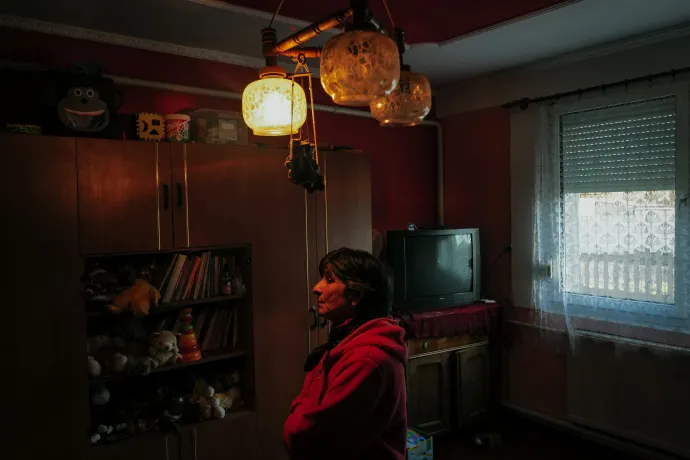
According to psychologist Anna Bátki, the relocation process consists of multiple controlled steps – for example, when a child is returned from foster care to their birth family, or when an adoption takes place. The duration and timing of the process is tailored to each case: it is affected by the age and temperament of the child. In any case, there should always be a counselor to supervise and adjust the process according to the circumstances. In short, "it isn't usually rushed." The new guardians gradually spend more time with the child, first just getting to know them in the presence of the foster parents. Then joint activities are organized, and the new guardians are involved in the care work. If necessary, they may even have the child over for an entire weekend.
According to the clinical psychologist, the immediate removal and complete turnover of the child at the first encounter is usually the case when there is a suspicion of endangerment, abuse, or neglect.
"It is highly questionable to remove a child from their place of care and transfer them to another in such a way that the process itself causes further trauma to the child. What might just be a street name and house number in an administrative file might be a family to a child. By default, children growing up without their biological family have to seriously struggle to form secure relationships with adults. They may have already endured serious abuse and trauma in the precarious situation that led them to be taken into care. As such, special care and attention should then be taken to ensure that the system itself does not cause further pain and distress to the child. In short, we need a trauma-sensitive child protection procedure that takes into account and enforces the child's fundamental rights and interests," Gyurkó wrote to Telex. She added that the need for this has already been expressed in the profession, but "it remains to be seen how and when these considerations will be implemented in everyday life and in official practice."
Unfortunately, according to Szilvási, there is currently no standard protocol in Hungary that specifically addresses the psychological and professional support that should be provided to those affected by such an unexpected change of care, i.e. the child themselves, the former and new foster parents, and other children in the families. There are big differences between foster care networks. The level of attention and care of the network varies quite a lot, she added. There is, however, a recent methodological publication on adoption, dated 2022, which dedicates a whole chapter to adoption by foster parents. It also points out that even when it comes to anticipated and planned instances of separation from the child due to replacement or adoption, foster parents who have a close relationship with the child need the help of professionals to cope with the loss.
The Balogs have not received any psychological help to deal with what has happened and, to the best of their knowledge, there is no such support available to Milán and his new foster parents.
According to Gyurkó, "there are serious shortcomings in Hungary's child protection system, but it cannot and should not be said that this is the only way to carry out the replacement, as there are much, much better ways to go about it." She noted, "that is why it is so important to have a professional investigation into such cases and a follow-up that would allow us to learn from the case."
This article was completed with the help of Alrite speech recognition application, as part of a paid cooperation.